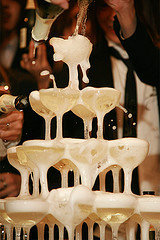Created by designer Mathieu Lehanneur, Once Upon A Dream is an innovative sleep capsule combining the best in science and design. It was unveiled for the first time in the US at DesignMiami, held from 30 November – 5 December 2010. DesignMiami is the marketplace for limited-edition design in Florida.
The sleep capsule has been designed to create a space that evokes resynchronization through touch, sight, smell and sound. The innovative design of sleep capsule, manufactured in Italy, provides ideal condition for a good sleep; from precisely the right temperatures to the right lighting. A hanging live plant, which is powered with a low grade current flowing through it, helps in enhancing the ambience.
In celebration of its US debut during DesignMiami, Veuve Clicquot has offered champagne bedtime stories in the Once Upon a Dream sleep capsule for guests, a luxurious experience which included a flute of Veuve Clicquot with each reading.


